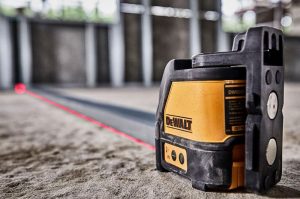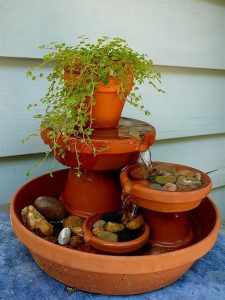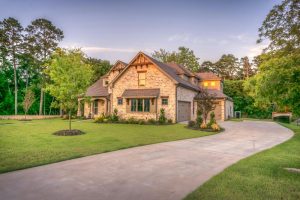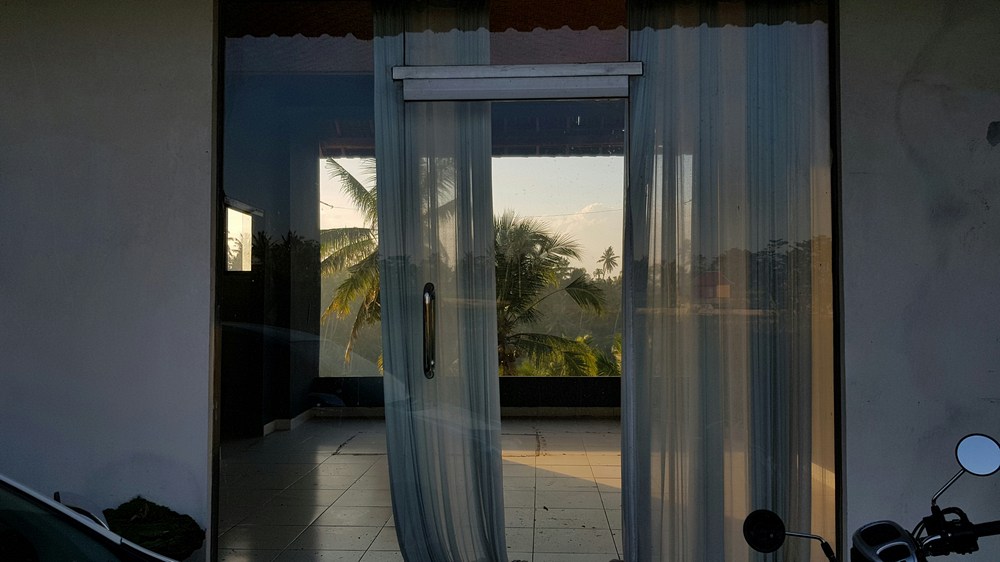Last Updated on February 13, 2024 by teamobn
Grilling with charcoal on a combustible platform is a fire hazard worthy of Wiley E. Coyote. Flames, embers, and heat from the grill base can cause a fire on a timber deck or porch. Of course, safety should be observed when you use a gas grill on a wood patio.
While grilling on a concrete or brick patio is ideal, you can use a gas grill safely on a wooden deck. Unlike a charcoal grill, you don’t have to worry about flying embers when using a gas grill. There is also no need to use chemical fire starters. These can be hazardous around dry wood.
Of course, there is still the risk of having propane and heat around flammable objects. However, with proper safety, you have less to worry about when using a gas grill.
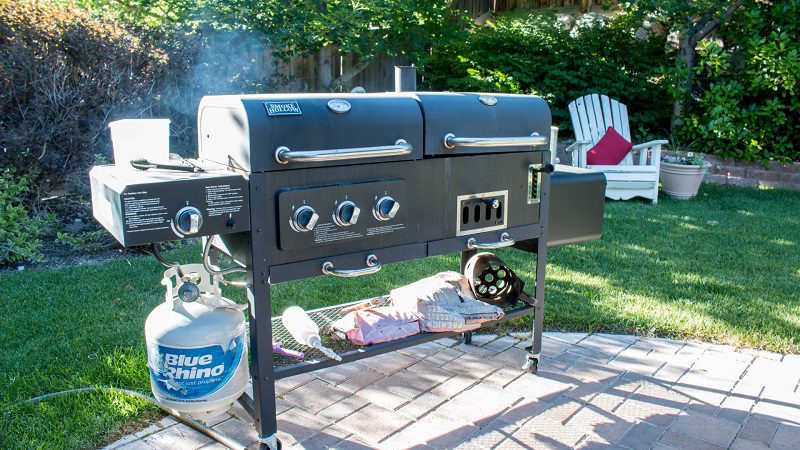
Contents
- 1 How to Use a Gas Grill on a Wood Patio
- 1.1 1. Set up your gas grill several feet away from the house.
- 1.2 2. Reduce the accumulation of grease around the grill.
- 1.3 3. Open the lid before turning the gas on.
- 1.4 4. Use a heavy-duty grill mat.
- 1.5 5. Keep the grilling area clear of flammable materials.
- 1.6 6. Take note of the weather.
- 1.7 7. Keep a fire extinguisher within reach.
- 1.8 8. Use the two-zone grilling method.
- 2 Selecting the Right Gas Grill for Your Wood Patio
- 3 Regular Maintenance Tips for Gas Grills
- 4 Conclusion
How to Use a Gas Grill on a Wood Patio
If you plan to host a barbecue, you should prepare in advance. Keep in mind the obvious fact that wood and fire are a dangerous combination. You should make doubly sure that you have taken proper precautions.
Below are a few tips to keep your family, yourself, your guests, and your home safe when grilling on a wooden deck or porch.
1. Set up your gas grill several feet away from the house.
The first thing you have to decide is where to situate your gas grill on a wood deck. You will need to find a spot several feet away from the main house. The farther your grill from your house, the better.
Do not set up under eaves or near trees with overhanging branches. A fire surrounded by wood and dry, flammable materials is an accident waiting to happen. Do not crowd the grill. Make sure there is ample space on all sides of your gas grill.
Confirm that the site you chose for your grill is level. Make sure the grill will not tip over. Block or lock the wheels on your gas grill to prevent it from rolling.
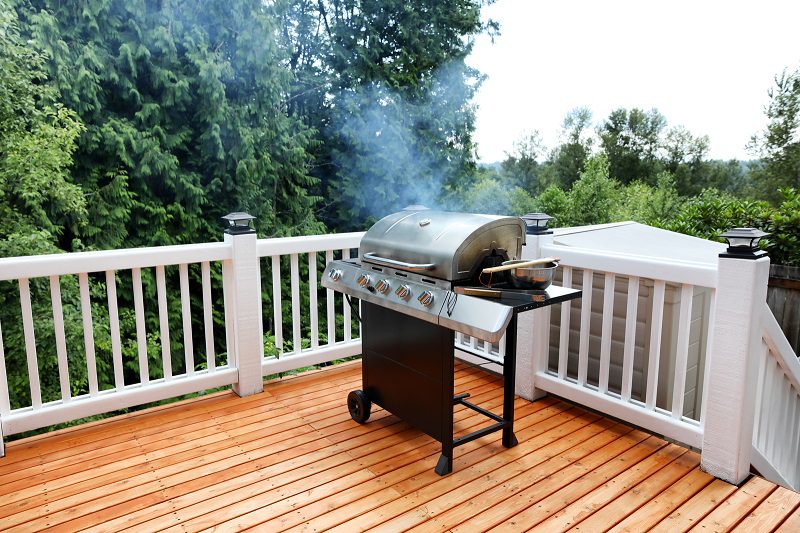
2. Reduce the accumulation of grease around the grill.
Remove any flammable accumulation of grease from your grates when you use a gas grill on a wood patio. Unclean, greasy grills are among the leading causes of fires while grilling.
You can reduce hazards by utilizing fire-resistant materials and tools, as well. For instance, you can use drip pans underneath your food. This will help reduce the grease that reaches your grill.
We favor Fig and Leaf Drip Pans. The base of each of these pans measures 7.5 inches by five inches. This makes it compatible with many of today’s best gas grills, including those in the Weber Genesis series.
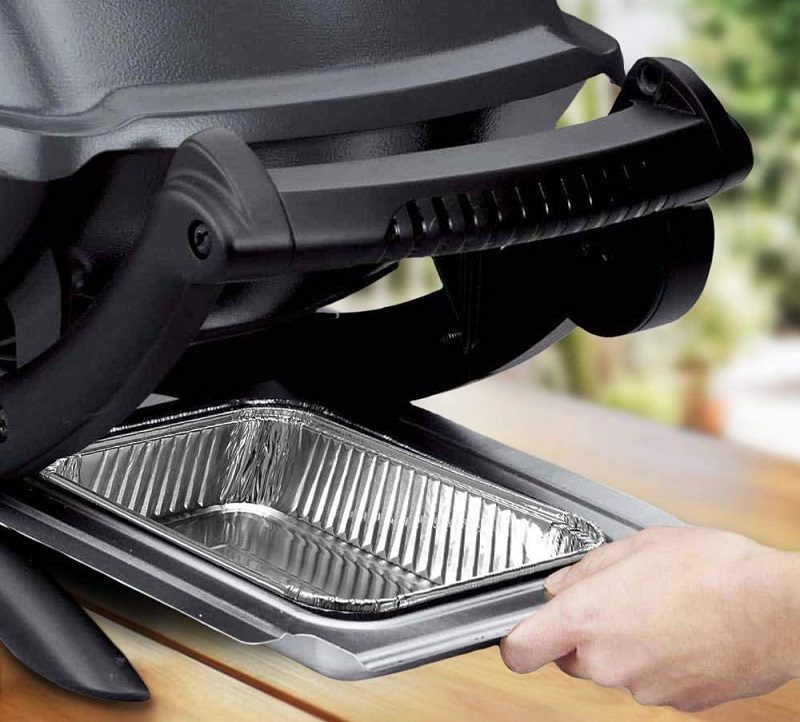
3. Open the lid before turning the gas on.
Make sure you open the lid before turning on your gas grill on a wood patio. A closed lid will accumulate gas. This can cause an explosion if there is a delay in hitting the ignitor.
Gas can also build up if the ignitor fails to light quickly. When this happens, wait about five minutes for the gas to dissipate before re-igniting
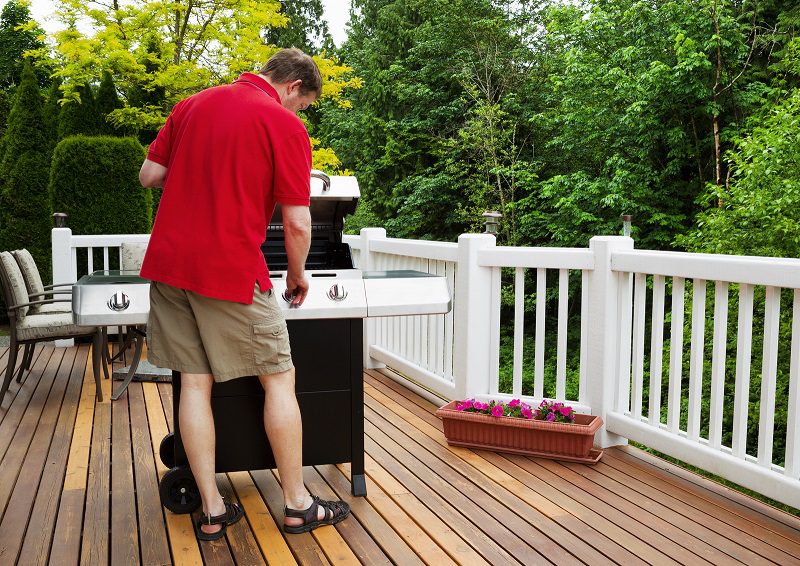
4. Use a heavy-duty grill mat.
We suggest that you use a grill mat. Not just any grill mat will do, either. You will need to find a mat that is heavy enough so that it isn’t blown around by the wind when you use your gas grill on a wood patio. The mat should also be large enough to cover your whole grill area with a few extra inches all around.
We recommend the Grillaholics Grill Mat for its price, size, durability, and versatility. You can use this heavy-duty grill mat for cooking and baking besides grilling, as well.
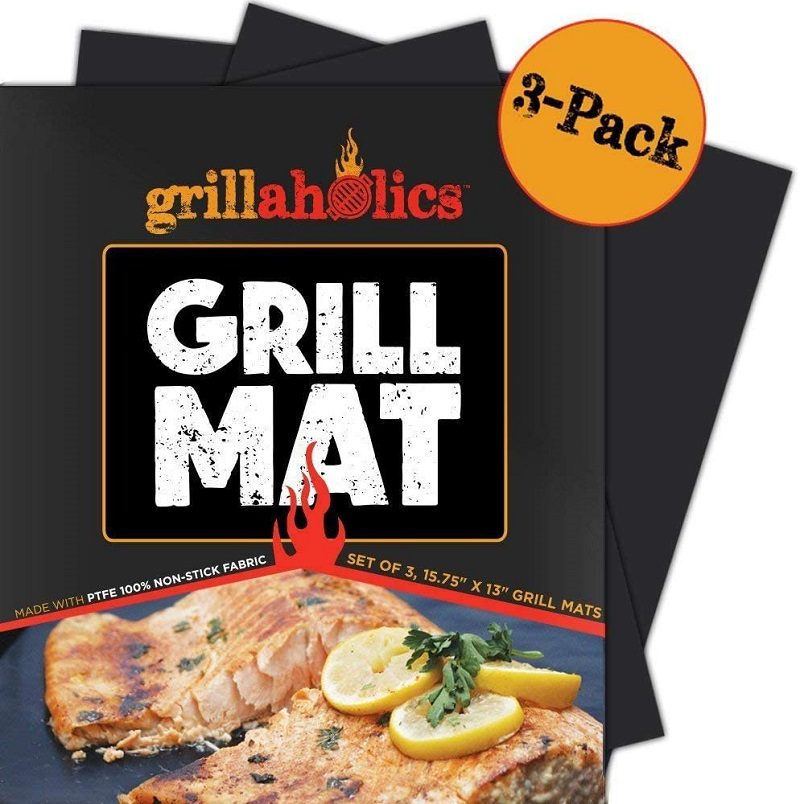
5. Keep the grilling area clear of flammable materials.
Good grilling requires constant motion on your part. You are always moving around, adding food to the metal or basting with a small brush with your gas grill on a wood patio. That can keep you quite busy. Even so, be sure that you avoid keeping any items that could catch fire near the grill.
Do not set such things as napkins or paper towels on nearby surfaces. Keep all flammable items away from the grill area. For safety’s sake, keep the surrounding three-foot radius around the grill clear when possible.
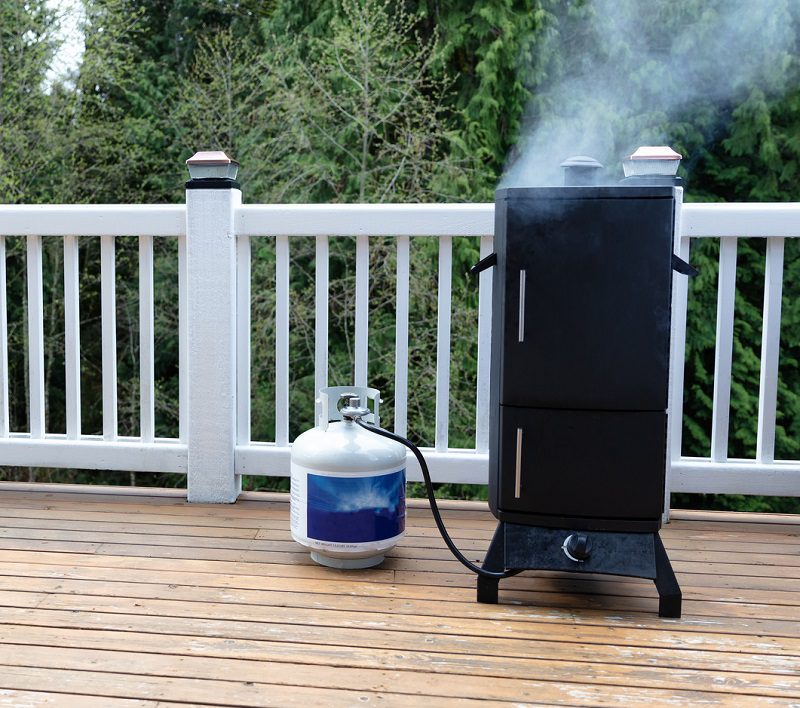
6. Take note of the weather.
Keep an eye on the weather before you use your gas grill on a wood patio. Depending on where you live, winds can pick up in an instant. Windy weather can quickly start a fire, setting nearby items and objects aflame.
If the winds pick up while you’re grilling, wait for it to dissipate before going on. In the worst case, you may have to accept that safe grilling simply isn’t possible.
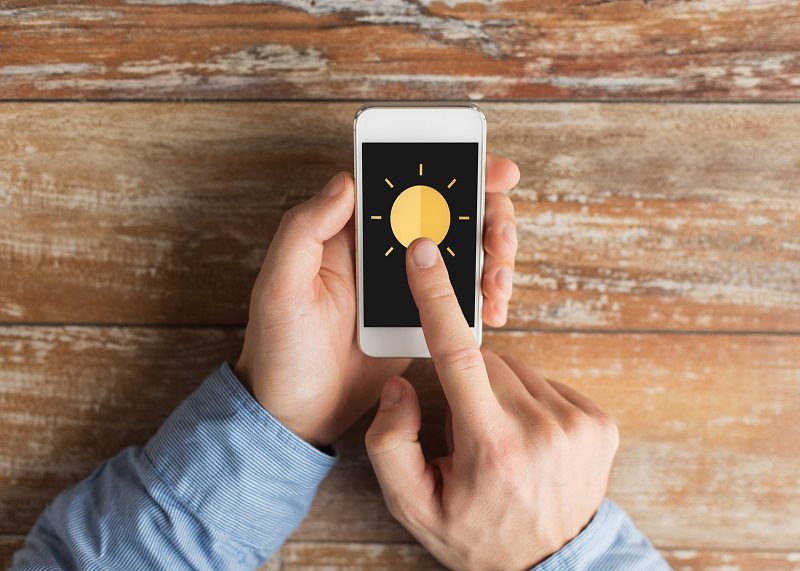
7. Keep a fire extinguisher within reach.
Even the best grillers have to put out an unruly flame from time to time. When you are grilling on a wooden deck, you increase all the inherent risks. That’s why you need to make sure that you have a fully charged fire extinguisher near you. You will be glad you have one for emergencies while using a gas grill on a wood patio.
For this, we favor the Amerex B402. This dry chemical fire extinguisher is long-lasting and reliable. It’s also the perfect size for general home use. The B402 will snuff out all kinds of fires: trash, flammable liquids, wood, and paper. It will even safely put out an electrical fire.
If you don’t have a fire extinguisher, you can use baking powder as a quick substitute. Baking powder is available in most kitchens. You just need to sprinkle some on an accidental flame to put it out quickly. Don’t use water. Water increases grease fire.
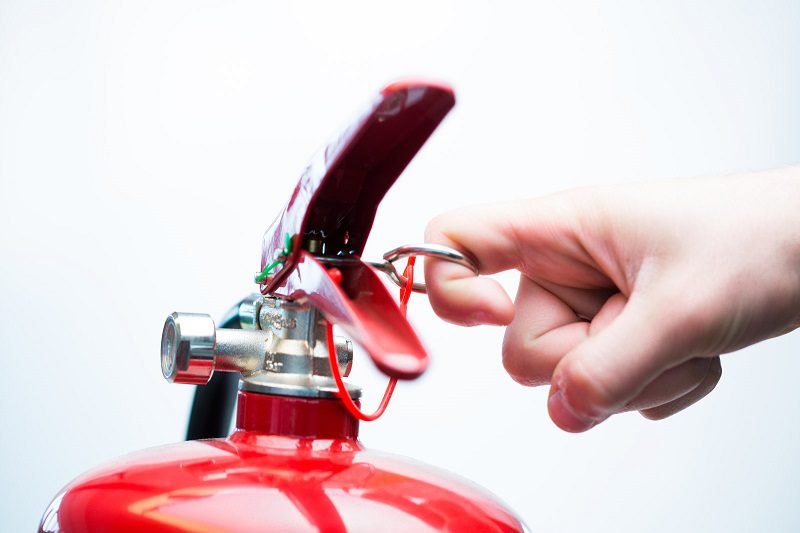
8. Use the two-zone grilling method.
Experts recommend using a two-zone cooking method to prevent dangerous flare-ups while grilling. The method involves establishing two different sides on the grill – hot and cold areas. This allows you to move the meat quickly to the cooler area when a flare-up occurs.
This will also help prevent fat from dripping onto the flames, and thus, minimize the flare-up. After moving the meat to the cooler area, you can put the lid back on the grill and wait until the flare-up dies down.
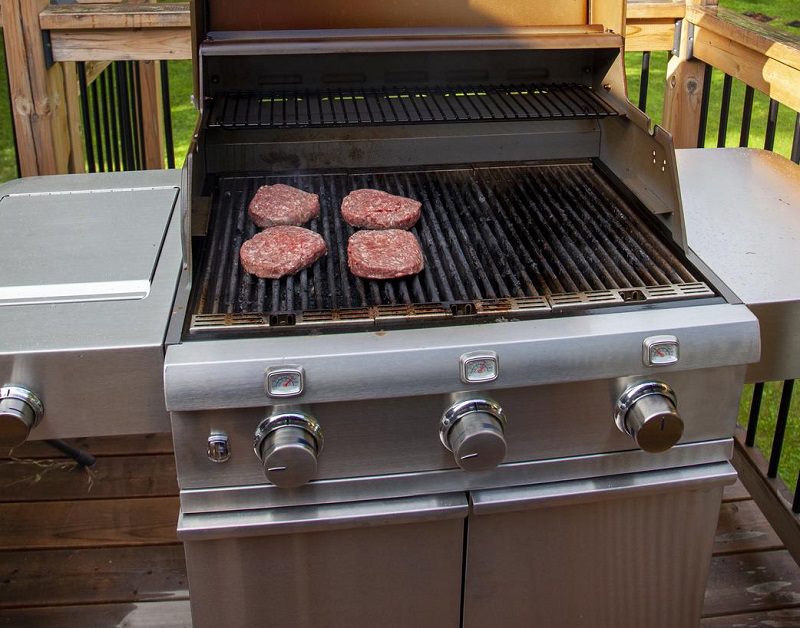
Selecting the Right Gas Grill for Your Wood Patio
Choosing the right gas grill on a wood patio is essential for both safety and enjoyment. A suitable grill can make your outdoor cooking experiences memorable and worry-free. Here’s how to select the best gas grill that complements your wood patio space.
Size and Space
When selecting a gas grill on a wood patio, it’s important to assess the available space carefully. The size of your wood patio will dictate the size of the gas grill you can comfortably accommodate. A compact gas grill might be the ideal choice for smaller patios, offering enough cooking area without overwhelming the space.
On larger wood patios, you can choose bigger gas grill models, which provide more cooking surface and options for entertaining larger groups. Ensuring adequate room around the gas grill on a wood patio is essential for safe operation is essential. This includes space for the chef to move freely and clearance from patio furniture and railings to prevent heat damage and enhance safety.
Safety Features
The importance of safety features cannot be overstated when using a gas grill on a wood patio. Given the explosive nature of wood, selecting a gas grill with advanced safety features is vital to reduce the risk of fire. Look for gas grills with an automatic shut-off feature, which can prevent gas leaks if the flame goes out.
Sturdy construction is another key safety feature; a well-built gas grill is less likely to tip over or wear down over time. Effective grease management systems are also crucial for a gas grill on a wood patio.
These systems help to collect and contain grease, significantly reducing the chance of flare-ups and making the gas grill safer to use on a wood surface. By prioritizing these safety features, you can ensure a safer grilling experience on your wood patio, protecting both your loved ones and your property.
BTU Ratings
Understanding BTU (British Thermal Unit) ratings is crucial when selecting a gas grill on a wood patio. The BTU rating of a gas grill reflects its heat output, which is a key factor in its cooking performance. However, a higher BTU rating doesn’t guarantee better cooking results. Instead, it’s important to choose a gas grill with a BTU rating that matches the size of the grill and meets your cooking needs.
This balance ensures that the gas grill on a wood patio uses fuel efficiently and maintains even cooking temperatures across the grilling surface. For a gas grill on a wood patio, finding the right BTU rating means you can enjoy perfectly grilled food without excessive fuel consumption or uneven heat distribution.
Build Quality and Materials
The build quality and materials of a gas grill are significant factors to consider, especially when the grill will be used on a wood patio. A gas grill with high-quality materials, such as stainless steel, offers durability and resistance to rust and corrosion. This makes it exceptionally suited for the varying outdoor conditions of a wood patio.
Stainless steel gas grills withstand the elements and maintain their aesthetic appeal over time. When selecting a gas grill on a wood patio, looking for one with solid construction capable of enduring frequent use and the outdoor environment is essential. A well-built gas grill ensures long-lasting performance and safety, making your grilling experience on a wood patio enjoyable and reliable.
Selecting the right gas grill for your wood patio involves considering space, safety, performance, and extra features. Choosing wisely allows you to enjoy countless meals and gatherings in your outdoor space safely and comfortably.
Regular Maintenance Tips for Gas Grills
Keeping your gas grill in prime condition is crucial, especially when it’s placed on a wood patio. Proper maintenance ensures safety and efficiency, extending the life of your grill. Here are targeted tips for caring for your gas grill on a wood patio.
Regular Cleaning
Maintaining a clean gas grill on a wood patio is crucial for both safety and the longevity of your grill. Each time you use your gas grill on a wood patio, grease and food residues can accumulate, posing a significant risk of flare-ups. To mitigate this, employ a grill brush to scrub the grates and interior surfaces vigorously after every use.
For a deeper clean, consider dismantling the removable parts of your gas grill on a wood patio and washing them with a dedicated grill cleaner or a simple solution of soapy water. This practice maintains the aesthetic appeal of your grill and ensures it operates efficiently, providing a safer grilling environment on your wood patio.
Inspecting for Gas Leaks
Regular inspection for gas leaks is an indispensable safety measure for anyone using a gas grill on a wood patio. Gas leaks can present a serious hazard, leading to potential fires or explosions if not addressed promptly.
To conduct a thorough check, apply a solution of soapy water along the gas line and connections of your gas grill on a wood patio, then turn on the gas to pressurize the system. Watch closely for any bubbles forming along these areas, indicating a leak. Identifying and fixing any gas leaks before using your gas grill on a wood patio is crucial to prevent accidents and ensure a safe grilling experience.
Burner Maintenance
Keeping the burners of your gas grill on a wood patio clean is essential for even heating and optimal performance. Over time, debris, grease, and food particles can clog the burner ports, leading to uneven flame distribution and inefficient cooking. Use a brush or a small pin to carefully clear blockages in these ports, ensuring that gas can flow freely for a consistent flame.
Furthermore, inspect your burners regularly for signs of corrosion or damage. If you find that parts of your burners are beyond cleaning or repair, replacing them is crucial. This step ensures that your gas grill on a wood patio continues operating at its best, providing reliable and even cooking for outdoor feasts.
Weather Protection
Your gas grill on a wood patio is exposed to the elements, which can cause wear and tear over time. Rain, snow, and even prolonged exposure to sunlight can lead to rust and other forms of damage, compromising the integrity and appearance of your grill. To protect your investment, it’s important to cover your gas grill with a durable grill cover whenever it’s not in use.
Choose a cover designed to fit your grill model snugly, providing maximum protection against adverse weather conditions. This simple yet effective measure can significantly extend the lifespan of your gas grill on a wood patio, keeping it in prime condition for years to come.
Tightening Loose Parts
Regular use and the natural vibrations from heating and cooling can cause the components of your gas grill on a wood patio to loosen over time. Loose parts not only affect the stability and safety of your grill but can also lead to uneven cooking and potential damage.
To prevent these issues, make it a routine to inspect your grill for any screws, bolts, or other fasteners that may have become loose. Tightening these parts ensures that your gas grill remains stable and safe on your wood patio. This maintenance task might seem minor, but it plays a significant role in your outdoor cooking setup’s overall performance and safety.
By following these maintenance tips, you’ll ensure your gas grill on a wood patio remains a safe and enjoyable tool for outdoor cooking. Regular upkeep improves performance and prolongs your grill’s life, making every barbecue a success.
Conclusion
Safely using a gas grill on a wood patio is achievable with regular maintenance and mindful practices. Ensuring your grill is clean, checking for gas leaks, protecting it from the elements, and securing any loose components are critical. These actions not only prolong the life of your gas grill but also safeguard your wood patio and enhance the safety of your outdoor cooking experiences.
For more safety tips when cooking on your porch, check out our guide on how to connect a propane tank to your gas grill!

